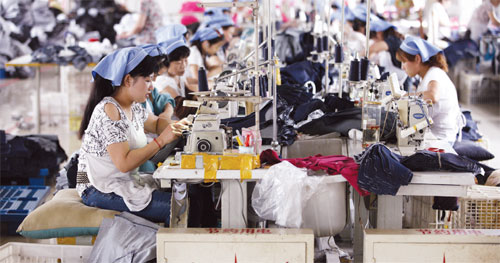US exporters show mild concern about renminbi volatility
Updated: 2015-08-14 09:21
By Luo Weiteng in Hong Kong(HK Edition)
|
|||||||||
Companies to adjust strategies to mitigate foreign exchange risks
US exporters are bracing for the challenges brought about by the strengthening of the US dollar against the renminbi.
The mainland's renminbi fell for the third day on Thursday with the People's Bank of China lowering the daily guidance rate by another 1.1 percent. Jeffrey Williamson, statewide director of California Centers for International Trade Development, said the renminbi depreciation is going to "make things worse" for US exporters, who have already experienced a loss of revenue for more than a year because of the appreciation of the US dollar against the euro.
Williamson said that he believes the slowdown in the Chinese economy, coupled with the renminbi devaluation, will produce a "compound effect", putting competitive pressures on the commodities and consumer goods sectors.
According to a Credit Suisse's report, the devaluation of the renminbi poses increased competition for US and European companies at a time of credit fragility and potential US Federal Reserve tightening.
Dwight Bonewell, director of Grand Napa Vineyards, a US wine distributor, said the renminbi depreciation is expected to cut sales by around 5 percent.
Williamson told China Daily that not all sectors of the US economy would take a hit from the weakening renminbi. For example, strong growth is expected in aerospace, electronics and machinery, he said.
The renminbi depreciation, Williamson noted, could prompt some US exporters, which normally produce goods in one place and sell them all over the world, to adjust their global business strategies.
"They may adopt the strategy of producing in multiple locations to mitigate the currency risks," he said.
This strategy could pave the way for the rise of micro multinationals, the small- and medium-sized enterprises which don't have the strong enough branding power to weather the storm, he said.
Jeff Jankovic, vice-president of finance at Initiative Foods, a US baby-food producer, said that the currency volatility has already become a normal part of doing business globally.
He believes that most US companies would be well-prepared to face the challenge by either adjusting their pricing strategies or cost strategies.
What matters in the long run is that consumers will not stop consuming just because the exchange rate has changed, said Williamson, who remains bullish on the long-term growth of US exports to the Chinese mainland.
What happens to the currency is that the initial changes on the foreign exchange market had shocked many business people because they weren't prepared for them. Once the exchange rates begin to stabilize, businesses will find a way to adjust their strategies accordingly, said he. But "if there is too much fluctuation in the foreign exchange market, people would find it hard to adjust", he added.
sophia@chinadailyhk.com
|
The slowdown in the Chinese economy, coupled with the renminbi devaluation, will produce a "compound effect", putting competitive pressures on the US's commodities and consumer goods sectors, experts say. Asia News Photo |
(HK Edition 08/14/2015 page7)
